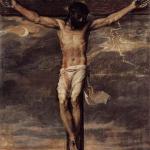The whole post, articulate to the core, by Darren Sumner is well worth your attention, exposing as it does Bruce Ware’s faulty method and faulty theology.
(6) A methodological critique: Where does this idea of an “authority-submission structure” within the Trinity come from? Ware, for one, is clear about the path of his logic:
As Son, the Son is always the Son of the Father and is so eternally. As Son of the Father, he is under the authority of his Father and seeks in all he does to act as the Agent of the Father’s will, working and doing all that the Father has purposed and designed for his Son to accomplish.
(Source, emphasis in original. See further Ware, Father, Son, and Holy Spirit: Relationships, Roles, and Relevance [Crossway, 2005].)
It is the Bible’s identification of these two divine persons as “Father” and “Son” that Ware takes as his starting point for reasoning through the nature of their relationship. Human fathers have authority over sons; in a right and godly relationship human sons submit to the authority of their fathers.
From the fact that they are revealed in terms of the father-son relation, Ware extrapolates that God the Father and God the Son have a relationship which corresponds to this human relationship. By using these names Scripture suggests that they relate as human fathers and sons properly do; the language isimplicitly revelatory in this way. For some readers this may seem a perfectly fine way of reasoning. For now I’ll table the full demolition (which ought to make reference to Sallie McFague’s work on language and predication) and just mark it with a label: natural theology. The EFS mode of reasoning is what Barth decried as human projection misidentified with divine revelation. Ware takes a human cultural construct and, mistaking it for revelation, reads it upward into the life of God by means of an analogia entis.
When he in turn derives from this divine relation a proscription for human gender relations, the circle is complete and the exercise in natural theology is made infinitely more egregious. Ware first reads the authority-submission structure from creaturely existence into the life of God; then he reads it back out again from God to human creatures — only now switching from the parent-child relation to male-female relations. The procedure is entirely self-referential, a theological systole and diastole: Ware has derived from his doctrine of God exactly what he put into it.















